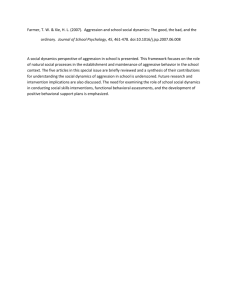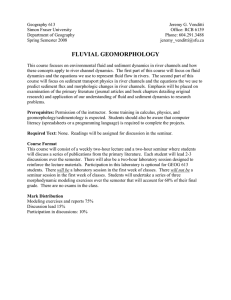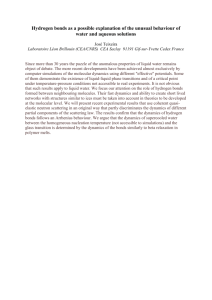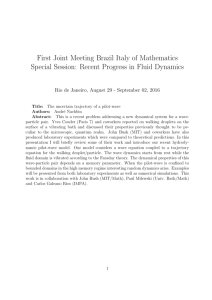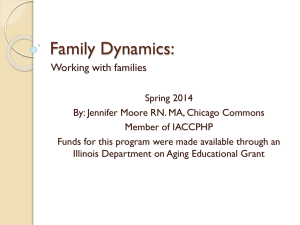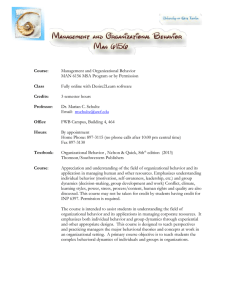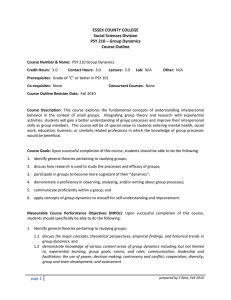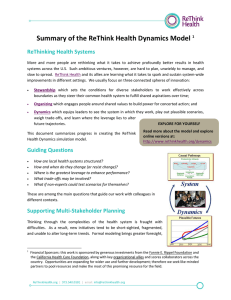Course Name
advertisement
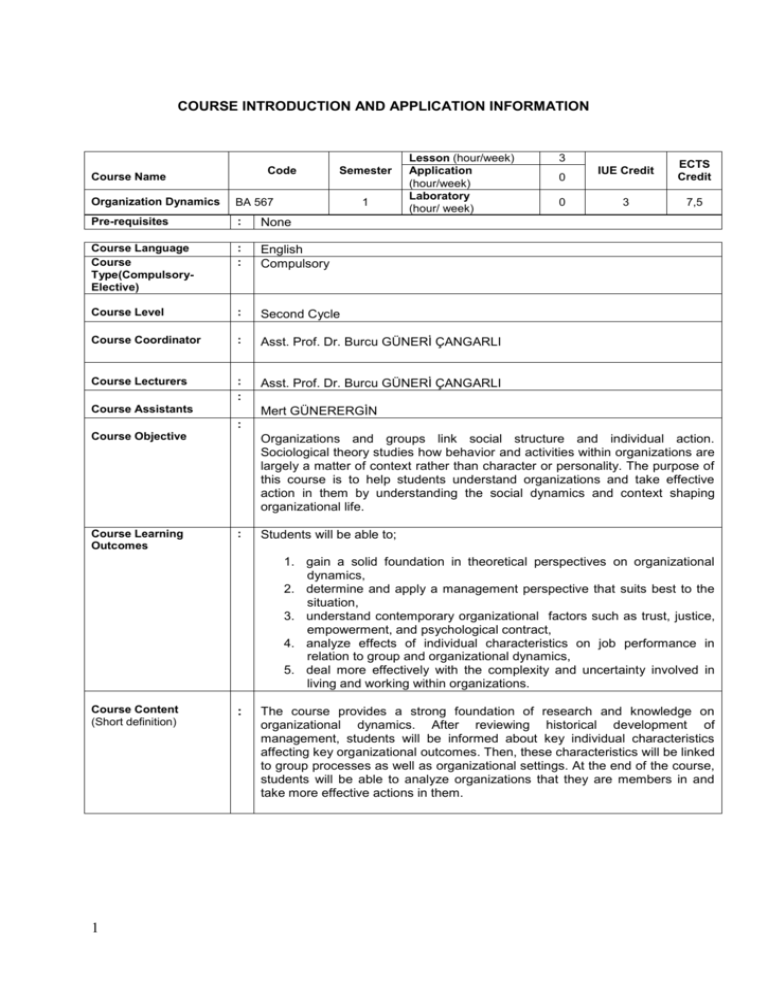
COURSE INTRODUCTION AND APPLICATION INFORMATION Code Course Name Semester Lesson (hour/week) Application (hour/week) Laboratory (hour/ week) Organization Dynamics BA 567 Pre-requisites : None Course Language Course Type(CompulsoryElective) : : English Compulsory Course Level : Second Cycle Course Coordinator : Asst. Prof. Dr. Burcu GÜNERİ ÇANGARLI Course Lecturers : : Asst. Prof. Dr. Burcu GÜNERİ ÇANGARLI 1 3 0 0 IUE Credit ECTS Credit 3 7,5 Mert GÜNERERGİN Course Assistants : Course Objective Course Learning Outcomes Organizations and groups link social structure and individual action. Sociological theory studies how behavior and activities within organizations are largely a matter of context rather than character or personality. The purpose of this course is to help students understand organizations and take effective action in them by understanding the social dynamics and context shaping organizational life. : Students will be able to; 1. gain a solid foundation in theoretical perspectives on organizational dynamics, 2. determine and apply a management perspective that suits best to the situation, 3. understand contemporary organizational factors such as trust, justice, empowerment, and psychological contract, 4. analyze effects of individual characteristics on job performance in relation to group and organizational dynamics, 5. deal more effectively with the complexity and uncertainty involved in living and working within organizations. Course Content (Short definition) 1 : The course provides a strong foundation of research and knowledge on organizational dynamics. After reviewing historical development of management, students will be informed about key individual characteristics affecting key organizational outcomes. Then, these characteristics will be linked to group processes as well as organizational settings. At the end of the course, students will be able to analyze organizations that they are members in and take more effective actions in them. WEEKLY SUBJECTS AND RELATED PREPARATION STUDIES Week Subjects Related Preparation Introduction to the Course September, 28th What is management?, Organization Dynamics, Management History Modern Times October, 4th EXECUTIVE MBA SEMINAR Managing in a Changing Global Environment October, 5th Case Discussion October, 12th Basic Challenges of Organizational Design Case Discussion October, 19th Organizational Culture nd November, 2 November, 16 OB Model Job Performance & Organizational Commitment Reacting to Negative Events Motivation Self-Assessments Self-Assessments Communication Human Face Negotiation November, 23rd November, 29th December, 7th Culture Analysis MIDTERM th November, 30th Case Analysis BAYRAM October, 26th November, 9th Case Analysis EXECUTIVE MBA SEMINAR Understanding Leadership Dynamics: Power & Politics Power Game Leadership Styles and Behaviors Leadership Game SOURCES Text Books : Jason A. Colquitt, Jeffery A. LePine, & Michael J. Wesson, Organizational Behavior: Improving Performance and Commitment in the Workplace, 2009, McGraw-Hill. Organizational Theory, Design and Change”, Gareth R. Jones, 5th ed., Prentice Hall, New Jersey. Robbins, S.P. & Coulter, M. (2009). Management, 10th edition, Prentice Hall. Related books and journals. Other Sources : Sunum/ Presentation : Students are expected present recent topics in the organizationa and management field. List of possible topics will be provided by the instructor. Exams : There will be one midterm and one final exam that cover course content. Midterm exam will be in-class exam while the final will be take home. EVALUATION SYSTEM SEMESTER REQUIREMENTS 2 NUMBER PERCENTAGE Assignments Executive MBA Seminar Mid-Term Final 5 2 1 1 TOTAL PERCENTAGE OF SEMESTER WORK PERCENTAGE OF FINAL WORK TOTAL OF GRADE 25 10 30 35 100 70 30 100 COURSE CATEGORY Ders Kategorisi (Sadece bir kategori seçilecektir)/ Course Category (Only one category will be chosen) Core Courses Major area courses Supportive Courses Media and management skills courses Transferable skill courses X WORKLOAD TABLE Activities Number 15 20 1 1 1 Class hours Related preparation and assignments Presentations Mid-Term Final Total workload 3 Duration (hours) 3 5 35 20 25 Total Workload 45 100 35 20 25 225
